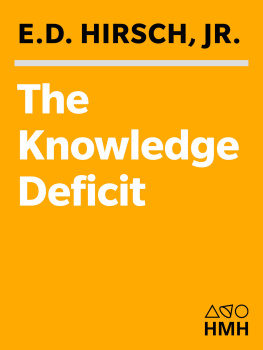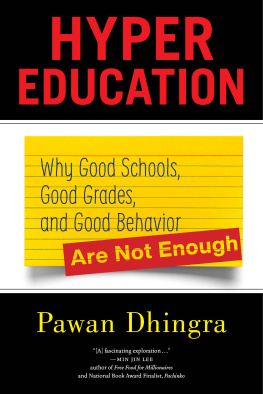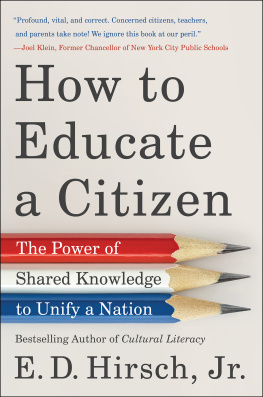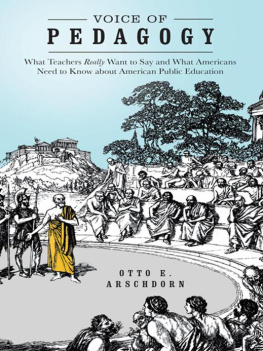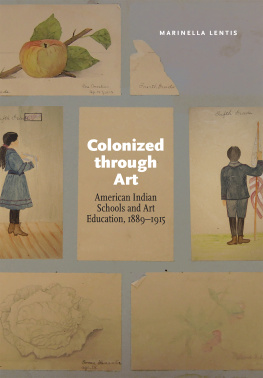The Making of Americans
E. D. HIRSCH, JR.
The Making of Americans
DEMOCRACY AND OUR SCHOOLS

Published with assistance
from the foundation established
in memory of William McKean Brown.
Copyright 2009 by E. D. Hirsch, Jr.
All rights reserved.
This book may not be reproduced, in whole
or in part, including illustrations, in any form
(beyond that copying permitted by Sections
107 and 108 of the U.S. Copyright Law
and except by reviewers for the
public press), without written permission
from the publishers.
Designed by Sonia Shannon.
Set in Bulmer type by
Integrated Publishing Solutions,
Grand Rapids, Michigan.
Printed in the United States of America.
Library of Congress
Cataloging-in-Publication Data
Hirsch, E. D. (Eric Donald), 1928
The making of Americans : democracy
and our schools / E. D. Hirsch, Jr.
p. cm.
Includes bibliographical references and index.
ISBN 978-0-300-15281-4 (cloth : alk. paper)
1. Public schoolsUnited States. 2. Education
Aims and objectivesUnited States. 3. Democracy and educationUnited States. I. Title.
La 217.2.H57 2009
371.010973dc22
2009011074
A catalogue record for this book is available
from the British Library.
This paper meets the requirements of ANSI/
NISO Z39.48-1992 (Permanence of Paper).
10 9 8 7 6 5 4 3 2 1
To the Memory of Albert Shanker
Contents
6. Competence and Community
Renewing Public Education
Appendix 1
Core Knowledge History/Geography Thread, K-2
Appendix 2
Content Is Skill, Skill Content
Preface
This book departs from and supplements my earlier books on education. It concerns itself, like them, with overcoming low literacy rates and narrowing the achievement gaps between demographic groups but places those themes within the broader context of the founding ideals of the American experiment, which have been a beacon to the world and ourselves. My goal in this book is to develop and explain neglected but fundamental principles that must guide our schools in our current historical situation if we are ever to achieve those inspiring ideals.
Our educational difficulties have arisen neither from incompetence nor from ill will but from adherence to ideas that have proved practically inadequate and scientifically incorrect. Although I reject the education worlds antipathy to a specific, grade-by-grade subject-matter curriculum, I praise its emphasis on humane teaching methods. Accommodation of the two views is possible if partisan caricatures recede. But accommodation is not my main theme.
This book proposes a rethinking of American K-8 education from the ground up. It outlines what American public education must be if it is to achieve greater quality and equity, as well as sustain the brilliant founding principles of the United States. My focus is on the early grades, because acquiring a We have paid a high price for a persistent adherence to this fallacious, how-to conception of early schooling in which critical thinking is supposed to transcend mere facts.
Ultimately, this book calls for a revolutionary change in the concepts and policies that guide many reformers as well as apologists of public education. If my arguments are accepted, it will mean repudiating ideas and slogans that have dominated early schooling for at least seventy years, and replacing them with different and more fundamental ideas. I do not contemplate easy acceptance. Max Planck shrewdly observed that professors do not change their minds: we have to wait for new professors. But because we cannot afford to wait, I hope that people outside the universities will enter the fray.
I begin by briefly describing the educational ideas of the American founders and their immediate successors. Such an excursion into history may strike some as an indulgence when practical reforms are so urgently needed. But the best way to overturn an outworn tradition is to develop more adequate founding principles. Those currently followed in our schools are neither as intellectually novel nor as venerably American as their supporters claim. They came into force only in the 1930s. Some knowledge of educational history can help us escape its more recent fetters.
This book addresses the particularly American character of our education. While I argue that our schools need to replicate the technical successes of high-performing schools elsewhere, I stress that they have special aims also that arise from our countrys transethnic character. Those characteristically American goals were identified by eloquent writers in the nineteenth century, nowhere more forcefully than by a young Abraham Lincoln in his 1838 speech The Perpetuation of Our Political Institutions. American schools play a critical role in our attempt to accommodate different groups and ethnicities in a peaceful and harmonious unity without requiring them to abandon their private identities. America remains the most successful experiment so far in creating what the philosopher John Rawls called a social union of social unions.
The elementary school has a special place in this great political experiment because it is the institution that prepares children to participate effectively in the common public sphere. Our ambition as a nation has been to give children from any and all origins a chance to participate there as equals, according to their talents and virtues, as Jefferson put it, no matter who their parents are or what language or religion they practice in their homes. As Horace Mann, the great nineteenth-century propagandist for public education, foresaw, competence brings community. To equalize opportunity through schooling is to create competent and loyal citizens.
I dedicate this book to the memory of my late friend Albert Shanker, who was president of the American Federation of Teachers. I decided to write it while reading Tough Liberal, Richard Kahlenbergs fine new Shanker biography. Als premature death a decade ago was a setback to American educational improvement. His unique combination of ideals, courage, and acumen was just what we neededand still needto reinstate the grand Enlightenment goals of the American school. His intellectual and political toughness and strong influence are irreplaceable. Als intellectual biography is the very image of what American schooling was instituted to accomplish. When he started in the schools of New York City he did not speak English. No wonder he defended the great aim of assimilation at a time when it was unfashionable to do so. His adversaries liked to advert to the militancy of his earlier days as a union leader. But to those of us who knew the statesmanlike Al of the 1980s and 1990s, those early days were irrelevant. We were drawn to his unique ability to overcome the left-right polarization of educational issues. I was especially grateful to Al for championing my ideas when it took great courage to do so. I have been labeled a conservative, but Al saw clearly that I am not. He saw that it is essential to our future that the left and the right get together on American education. The need to get beyond facile liberal-conservative labeling is a recurring theme of this book.
1
The Inspiring Idea of the Common School
In a picture in the Library of Congress entitled The Common School, taken in 1893, you can just make out the face of the teacher, Miss Blanche Lamont of Hecla, Montana, wearing a sweet, ironic smile. For the photo she has perched some boys (and a dog) up on the support logs, and she has given a prominent place to the young boy in the front with the big hole in the knee of his pants.
Next page

